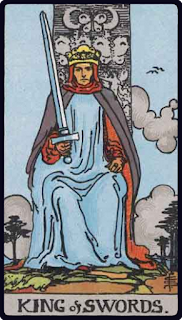
Representing the paternal nature; the King of Swords represents the culmination of achievement, confidence and authority combined in one. The King of Swords is a sign that our understanding has reached its limit and that our focus should now shift to other desires and new ideas.
In the upright state the King of Swords is a prompt to let go of the things we have been focusing on and accept that we have done all that we can. Our hard work will not be undone in this act but rather the strength and significance of our achievement will become self-evident.
In the inverted state the King of Swords emphasises our unwillingness to let go and the effect upon us this inability to let go is having. To rest on our laurels and hold onto one achievement alone is a disservice to our experience and dismisses the value of our potential contributions.
In the Rider-Waite deck the King of Swords sits upon a throne looking outward at the reader in judgement. The King holds a single sword in their right hand as with the Queen of Swords once more held in assertion of their just nature. The throne itself is topped with 3 butterflies in a triangle pattern representing masculinity two-fold the butterflies themselves and the upward triangle. Above these butterflies again two crescent moons can be seen representing the awareness of risk and danger kept in balance once more.
Where the Queen of Swords is forward looking, with a focus on future generations, legacy, and potential through the act of nurturing, in contrast the King of Swords is reflective and maintains order in the present. This distinction is depicted by the direction of their gaze, where the Queen of Swords looks out to the right at the future to the East where the Sun rises, the King of Swords looks outward at the reader.
Neither monarch looks to the past as there is no future within the past and no enjoyment within it, nostalgia is dismissed here as sentiment that belongs to the Suit of Cups.
In self-reflection the King of Swords serves as a prompt to consider your openness and your secrecy and reflect on how much you choose to share. As mentioned previously, the King and Queen of Cups both deal with fostering understanding. Whilst the Queen of Swords focuses on the individual, the King of Swords instead focuses on the wider environment.
The purpose of the King is to promote a culture of understanding this means engaging in conversations and raising awareness of mental health and well-being. Wanting to be open and honest about your life has noble intent, but just as it is important to recognise when to be vague and generic when engaging on an individual level it is also important to recognise the impact you have on the wider environment.
This doesn’t necessarily mean adopting the pejorative “woke” sentiments or sensitivities if you are not inclined to do so; but rather to recognise that you are part of a wider environment but also create an immediate environment that centres around you. Whilst these do not have to be in harmony and can be in complete opposition, the important thing to recognise is that the environment you create not only determines how approachable you appear to others, but also the level of influence and the polarity of that influence they perceive in turn, whether this is positive, negative, or neutral overall.
In online parlance the phrase “trauma dumping” has been coined to describe the unwanted solicitation of advice on mental health issues from others by openly imparting traumatic information. Being aware of who may read what you write or hear what you have to say is important as it helps shape your communicative process. In corporate communications and public relations parlance this is termed as audience awareness or key demographics, whilst the amount of time spent considering your source of influence is in turn referred to as mindshare. On an individual level, people treat others in a similar way to how they treat companies. You have a personal brand, whether you like that concept or not is irrelevant, the focus here is understanding how others perceive you, not what you think of them.
The simplest question here is to ask “How can I make a positive contribution?” and “Who might see or hear what I have to say and what impact might I have?” the emphasis here is to reflect on tone and think of communication not simply as projection but as the connection of two endpoints. To attempt to communicate with no regard for who might see or hear, or to dismiss how you will be perceived entirely is not an act of communication it is the definition of preaching which leads others to regard you as self-righteous and arrogant. A King can only rule in this regard when personality compensates for this action creating a cult of personality; in the absence of charisma those who attempt to rule in this manner are regarded as despots and dictators.

No comments:
Post a Comment
All comments are moderated before they are published. If you want your comment to remain private please state that clearly.